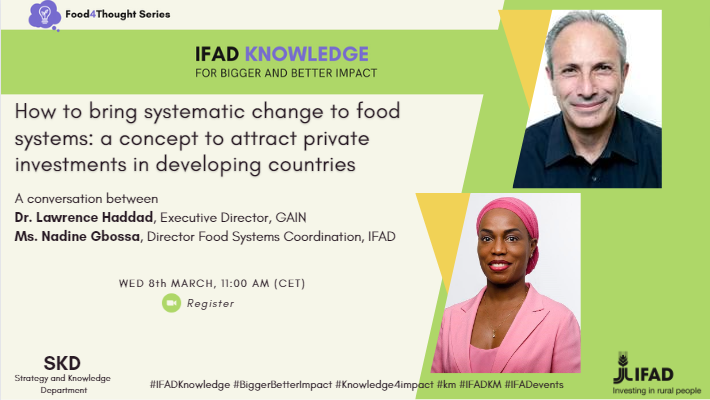SEED FUNDING JOINT PROGRAMMES
Egypt
Strengthening Sustainable and Resilient Food and Nutrition Systems in Egypt for SDG Acceleration




PROJECT TITLE | Strengthening Sustainable and Resilient Food and Nutrition Systems in Egypt for SDG Acceleration |
| Context | Egypt engaged actively in the 2021 Food Systems Summit process, convening a national dialogue and developing national pathways with recommended interventions for improving food security and nutrition by 2030. To enhance multi-sectorial coordination and spearhead the transformation process, the Government created a National Committee for Food and Nutrition Systems chaired by the Prime Minister and bringing together several ministries to coordinate joint actions. Strengthening coordination mechanisms, fostering multi-stakeholder partnerships, consolidating accountability structures, focusing on the availability of evidence, analysis, and data, are identified as key priorities to strengthen the food systems governance structure in Egypt. |
| PUNOs | WFP, FAO, UNICEF |
| Contribution to SDGs | SDG 2 Zero Hunger, SDG 3 Good Health and Well-being, 12 Responsible Consumption and Production. |
| Contribution to other SDG transitions | Climate, biodiversity, pollution |
| Duration | June 2024 – May 2025 |
| Expected financial leverage | $87,000 (PUNO co-financing) |
| Alignment with SG Call to Action | Policy integration; Food systems governance; Research, data, technology and innovation; Inclusive and participatory design; Private sector engagement |
| Outcomes | The JP contributes to strengthening policy and governance frameworks for food systems transformation and generating evidence and analysis on key dimensions of food systems to inform decision-making, supporting the work of the National Committee for Food and Nutrition Systems. The JP complements the government’s flagship program “Country Platform for the Nexus of Water, Food and Energy”, which provides a mechanism to mobilize climate finance and private investments. |
| Partners |
|
| Outputs |
|
IFAD Food 4 Thought Event: How to bring systematic change to food systems

©IFAD
This Food 4 Thought event was hosted by IFAD and featured a conversation with Dr. Lawrence Haddad, GAIN’s Executive Director, and Ms Nadine Gbossa, Director for Food Systems Coordination in IFAD, on how to bring systematic change to food systems. The discussion was introduced by Dr. Jyotsna Puri, Associate Vice-President of Strategy and Knowledge Department at IFAD and moderated by Lenyara Fundukova, Senior Knowledge Management Specialist at IFAD. During the event, actors and related mechanisms that can attract private sector investment in developing countries to generate a positive food systems transformation, were explored and discussed.
View the full event recording.
About the Speakers
Dr Lawrence Haddad is GAIN’s Executive Director since 2016. From September 2020 and up to the United Nations Food Systems Summit that took place on 23 September 2021, Lawrence chaired Action Track 1: Ensuring Access to Safe and Nutritious Food for All. Lawrence is also the co-convener of the Standing Together for Nutrition. Prior to GAIN, Lawrence was lead author of the Global Nutrition Report, Director of the Institute of Development Studies (IDS), and Director of the Food Consumption and Nutrition Division at IFPRI. He is the winner of the 2018 World Food Prize together with David Nabarro. Click here for more.
Ms Nadine Gbossa is a senior development professional with over 20 years’ experience dedicated to sustainable development. In October 2021, Gbossa was appointed as IFAD’s Director for the Food Systems Summit follow up. She is also the Chief of Means of Implementation with the UN Food Systems Coordination Hub. As a Country Director and Regional Head for IFAD, Gbossa worked in several African countries with vulnerable communities, governments, development partners and the private sector for inclusive growth. With IFAD in Nigeria, Gbossa managed the largest country programme in the region and she was later appointed as Director for the West and Central Africa region.
